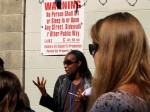Students from UCLA’s Luskin School of Public Affairs took a tour of a community center on Skid Row in downtown Los Angeles Friday morning as part of a recent series to help students address the issues of homelessness in Los Angeles.
The event series was organized by two Luskin graduate students who aim to increase UCLA student engagement with the issue of homelessness. Luskin students in multiple fields, including urban planning and public policy, have been invited to develop a deeper understanding of the issue of homelessness for their studies.
A panel discussing different agencies, such as the Skid Row Housing Trustthat engage with the homeless population, started the series earlier this month. It will conclude with a fundraiser on Nov. 23, said Martha Washo, a graduate student studying public policy and one of the organizers of the series.
Washo said the series is an attempt to provide students with firsthand experience of the issues that are relevant to homeless individuals. Events like Friday’s tour are meant to inspire students to be more invested in developing strategies to combat homelessness beyond the confines of the classroom.
“My hope is that we don’t have to accept (homelessness). My hope is that students will engage with the issue in ways they wouldn’t have before,” Washo said.
In the past, the community center was primarily toured by social welfare students as part of their curricular requirements. However, last year, Washo participated in the first tour organized for students in other departments of the School of Public Affairs. Washo said two public policy students decided to organize the tour last year with the intent of enriching the learning experience of more students within the school.
“If we’re studying these issues of homelessness and policy, we need to get out of the classroom and come into human contact with the people affected by (homelessness),” Washo said.
Washo said her understanding of Los Angeles’ homelessness problem has improved over the years from initially passing by the area with faint curiosity to emerging with a desire to provide other students the opportunity to analyze the issue through a critical lens.
“When I got (to Los Angeles) the homelessness jumped out at me. I asked myself, ‘Why isn’t anyone doing anything about this?’ … then I asked myself, ‘Why aren’t I doing anything about this?'” Washo said.
Washo said she thinks the tour laid a good foundation for the next panel discussion in the series, scheduled for Nov. 7, on issues of chronic homelessness.
“The goal now is to harness (the students’) energy and interest and do something more than just talk about (homelessness),” Washo said.
At the center, which has been serving the community since the 1950s, residents are provided transitional housing until they are able to secure housing of their own. They are then offered workshops in personal development and recreation including poetry writing, computer labs and a book club.
“The goal is to get them into housing and help them build social networks,” said Njambi Kingori, a UCLA alumna and deputy director of social services at the center.
Janine Berridge, a graduate student studying public policy, said she was aware of the poverty divide in the United States before she arrived in Los Angeles, but was not expecting to encounter homelessness as highly concentrated as in Skid Row.
Berridge, who has previously observed poverty in Zambia said while poverty in the U.S. and Africa is different, she thinks some of the models of community coordination and support she studied could apply to Los Angeles as well.
After living in Los Angeles for a year, Berridge said she has come to notice a complacent attitude toward homelessness held by Angelenos.
Before the tour, Berridge expected there to be priority services for the population of women and children, but said she was shocked upon learning that these services are in decline.
”Everyone that lives in L.A should go down to Skid Row. If you’re not aware of a problem, how can you solve it?” Berridge said.
Kingori said she is happy whenever she sees students at the center because there is always the hope that one of them will come back, just as she did, and bring change.
“I hope they gain an understanding of what homelessness is all about … I hope they bring back whatever they learn back into their community,” Kingori said.
